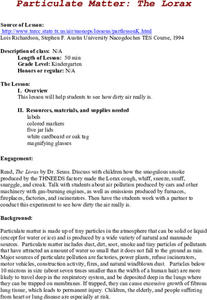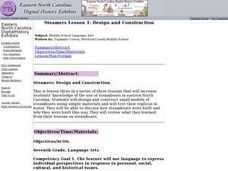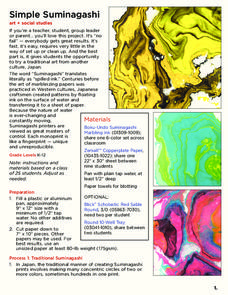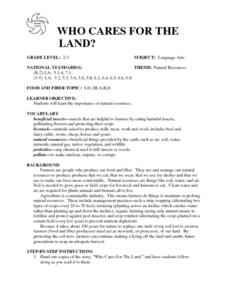Curated OER
Particulate Matter: The Lorax
Students investigate how dirty air is outside. They read and discuss the book, The Lorax, by Dr. Seuss. They investigate using jars and lids to compare the dirt left each day as they remove the lids. They observe the lids and discuss if...
Curated OER
Polluted Rain
Young scholars identify and analyze how acid rain can affect the environment. They then explain how air, water, and pollution interact and conduct pH tests to find acidity levels in water. Finally, students become "Pollution Watch...
Curated OER
Science NetLinks: Color Burst
Students gain experience in asking questions and conducting inquiry by exploring the separation of colors in water and other solvents; to communicate and share findings of student investigations.
Curated OER
Brine Shrimp 1: Hatching Brine Shrimp
Young scholars develop an understanding of how the growth and survival of an organism (brine shrimp) depends on physical conditions. This is accomplished by designing an experiment to determine the optimum salinity of water needed to...
Curated OER
Steamers Lesson 1: Design and Construction
Students examine the use of steamboats in North Carolina. In groups, they design and contruct their own small models of steamboats using simple materials. They test their models in water and share how they were built and why. They...
Curated OER
The Air We Breathe
Students discover the cuases of pollution. They investigate different pollutants that exist. Stsudents research technologies developed by engineers to reduce the amounts of air pollution. Upon completion of assigned activities,...
Curated OER
Ecosystems
Sixth graders perform various labs, create presentations, and do hands on activities to explore the ecosystem.
Curated OER
Food and Fiber: Helping the Environment and You
Fourth graders explore the many uses of corn-based products and the importance of water resources. They consider how biodegradable products help to keep water clean. They perform experiments to observe how corn pellets dissolve while...
Curated OER
Shake Jars
Students investigate different sounds. In this lesson on sound, students put different substances into jars so that when students shake the jars they make different sounds.
Curated OER
What is a Watershed, Anyway?
Students constrct a watershed and write about their observations. Students use maps to locate their area in relation to the watershed and inquire about what is applied to the ground above.
Curated OER
Oil Well That Ends Well
Focusing on the effect of oil spills on the environment, learners conduct experiments to explore this issue. First, they create an ocean environment using materials provided. Then, they make a simulated crude oil substance from vegetable...
Teach Engineering
Biological Processes: Putting Microbes to Work
Is there such a thing as useful microbes? Get ready to perform experiments on applying microbes for wastewater treatment. The first installment of the three-part unit provides background information to prepare young engineers for two...
Curated OER
Bubble Activities
Students participate in a variety of activities that involve bubbles. In this bubbles lesson plan, students make bubbles out of a soap solution, make bubble domes, make bubbles with their hands, and more.
Curated OER
Artist in Schools Program
Young scholars explore the medium of watercolor paints. They observe basic watercolor painting techniques (such as wet-on-wet, wet-on-dry and dry-on-dry). Then students experiment with these techniques on small squares of watercolor paper.
Curated OER
HOW IS PH DETERMINED?
Students estimate the pH based on the use of an unknown substance, determine whether an unknown substance is acid, base or neutral, and evaluate, by the pH determination, which of the unknowns is the strongest acid or base.
Curated OER
Tadpole Diary
Second graders examine the life cycle by observing tadpoles. After reading the book, Tadpole Diary, they draw the stages of tadpole development and write sentences about what they think is happening.
Forest Foundation
The Sustainable Forest
As part of their examination of forest ecosystems, class members examine how foresters, biologists, botanists, geologists, and hydrologists work to together to develop a management plan for sustainable forests.
Curated OER
Comparing the Degree of Unsaturation of Margarine with that of Butter
Is butter better? In terms of saturation, young chemists find out! Using titration methods, they will compare the degree of unsaturation of butter with that of margarine. Knowing the unsaturation, they can make conclusions about the...
Curated OER
A Solubility Curve for Potassium Nitrate
Step-by-step laboratory instructions are listed so that chemistry explorers can consider the solubility of potassium nitrate. They combine their results with those of other lab groups and then graph the data to display the solubility...
California Academy of Science
Coral and Chemistry
Using cabbage juice as a pH indicator, future scientists explore the effect of increasing carbon dioxide on the pH of the ocean and relate it to the health of coral reefs. Ideal for an earth or environmental sciences course, this lesson...
Curated OER
Simple Suminagashi
What a wonderful way to meld art and culture! Learners create art work in the Suminagashi style using this detailed lesson plan. This art form, which is Japanese in origin, employs ink to create beautiful results. This will be a hit with...
Dick Blick Art Materials
Simple Suminagashi
Go ahead. Spill the ink! Combine the study of art, social studies, and science with a Suminagashi (spilled ink) activity that produces "unique and unreproducible" works of art.
Curated OER
Who Cares for the Land?
A very thorough lesson plan focuses on what plants need to grow and stay healthy. There are excellent reading activities and worksheets included in this fine plan. A terrific way to introduce a unit on plants and their needs.
Curated OER
Student Safety Contract
With spaces for both your science pupils and their parents to sign, this laboratory safety contract is a must-have for your science classes. Twenty-one rules applying to protection and hazard prevention are listed. Discuss them with your...

























